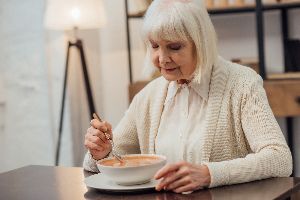A Guide to Soft Food Diets for Seniors

If your senior loved one recently underwent surgery, has digestive problems, or struggles to chew certain foods, their doctor might recommend a soft food diet. This consists of eating foods that are low in fiber, which gives them a soft texture and makes them easy to digest. Here's what to know about these diets and how a home health aid can help with nutrition.
What Foods Are Allowed?

Soft foods typically contain about two grams of fiber per serving. Meat options may include fish, chicken, and turkey along with ground beef or sausage patties and tender cuts of beef and pork. If your loved is a vegetarian or has a sensitivity to meat, eggs, creamy nut butters, and tofu are high in protein and can serve as substitutes. Fruits and juices without pulp, such as bananas, applesauce, and canned peaches, are typically easier to chew and digest. Doctors and nutritionists also usually recommend well-cooked or canned vegetables without seeds or skin.
In terms of carbohydrates, white rice, pasta, and noodles made with white or refined flour are best, as they do not contain whole grains that might be difficult to masticate or cause digestive upset. Most dairy products are permitted as long as they do not contain fruit, seeds, or nuts. Additionally, smooth desserts such as ice cream, pudding, and gelatin are safe to eat on a soft food diet.
Other Considerations
Chewing foods thoroughly can make them easier to digest. A home health aid may monitor your loved one during meals and make sure they macerate thoroughly before swallowing. Additionally, eating smaller meals four to six times per day can help the body process foods. An in-home caregiver may provide your friend or family member with reminders about when to eat and assist with preparing dishes. They can also encourage your loved one to drink plenty of water throughout the day, which may help foods pass smoothly through the digestive system.
Since a soft food diet excludes many nutritious foods, taking a multivitamin can prevent nutrient deficiencies. A home health aid may remind your loved one to take these vitamins along with any other medications. Additionally, eating a wide variety of items from different food groups can help your elderly friend or family member get the nutrients they need to remain healthy. A home health care provider may prepare balanced meals that include a combination of carbohydrates, meats, and dairy along with plenty of fruits and vegetables.
If your senior loved one needs to eat a soft food diet, get in touch with Safe Haven Home Care Inc. They provide in-home health care, including meal prep and nutrition assistance, to clients throughout Queens, Manhattan, Bronx, Staten Island, and Brooklyn. Call (718) 968-6970 to schedule home health care for an elderly friend or family member, and visit the website to learn more about how they can improve quality of life for seniors.
About the Business
Have a question? Ask the experts!
Send your question

